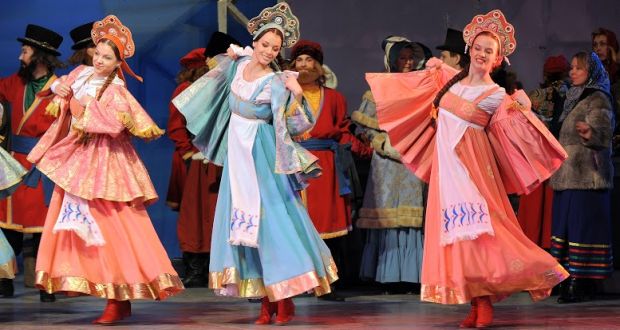Pros: There is an excellent variety of genres on show and the pieces are beautifully staged and delivered.
Cons: It being the London Coliseum, ticket prices are quite prohibitive. I think this production is even considered quite cheap for ballet . . . A really exciting evening of ballet that has been extremely well programmed to provide a great variety of dance. Perfect for someone who has never watched ballet before.
Summary
Rating
Excellent
I suggest that anyone looking for a piece of expert ballet criticism click away now. This is a review of a ballet production for anyone who doesn’t know their demi-pliés from their pas de deux, or even what those things are.
Programmed as the second part of the Diaghilev Festival of Ballet, these three pieces are apparently lesser performed works in the repertoire of the Moscow State Music Theatre for Young Audience. I was none the wiser to this, but what I did experience was a brilliantly programmed evening of ballet sampling three very different genres and giving the lay people in the audience a great education of what ballet has to offer as a form of entertainment.
The first dance, Petrushka, is a short narrative ballet in four movements and the only piece of the night with a clear story. Set in the Russian olden days, a village magician (Maxim Podshivalenko) brings three of his toys to life in the midst of the Shrovetide festival. One of them, the clown Petrushka (Pavel Okunev), develops human feelings so strong that he falls in love with one of the other toys, a ballerina (Renata Burtseva). The ballerina, however, is in the possession of the magician’s other toy, the Moor, who stabs Petrushka and kills him. The magician then turns Petrushka’s dead body into a toy again to spare the crowd the horror, but as the piece ends he is haunted by Petrushka’s ghost. I incidentally found it quite surprising to see a dancer in black face playing the Moor, but nobody else seemed to mind.
With music by Stravinsky and a story based on Russian folk tales this is an enchanting piece that gives a great sense of Russian history and folk traditions. The setting of the Shrovetide Festival is also a lovely platform for showcasing many types of festive dance. Oh, and there is plenty of that knee-bending Cossack dancing stuff which is great fun.
The second two dances, Chopin’s Chopiniana and Borodin’s Polovtsian Dances have no story as such but are abstract pieces showing two very different types of dance. The dream-like Chopiniana, set in the ruins of a castle in moonlight, is supposedly the romantic dream of a poet and is deliberately simple and elegant. The experience is the white-fluffy-tutu-and-pointed-toes kind of thing that you might think of as stereotypical ballet. The movement is absolutely gorgeous, combining a large female ensemble and a few solos, all set to Chopin’s gentle waltzes.
Polovtsian Dances, an extract from Borodin’s opera Prince Igor is a very different affair. This is an explosive war-like dance set in the Polovtsian war camp. Soldiers beat the floor with their fists and prisoners frantically twirl around the campfire. A choir is brought on from wings to provide a booming accompaniment to this finale that left me with my spine tingling.
This is a thrilling evening of ballet that should be particularly praised for the care with which it has been programmed. However, as I looked around me in the audience and noticed that London’s pouting Russian millionaire community seemed to have decamped to the Coliseum for the evening, I realised that the cost of tickets might put the lay people off, which is a pity. Still, I’d say it’s worth a treat if you can afford it.
Choreographer: Michael Fokine
Director: Andris Liepa
Composers: Igor Stravinsky, Frédéric Chopin and Alexander Borodin
Musical Director and Conductor: Alevtina Ioffe
Producer: ENO, as part of Les Saisons Russes du XXI Siècle
Booking Information: This show has now completed its run.
 Everything Theatre Reviews, interviews and news for theatre lovers, London and beyond
Everything Theatre Reviews, interviews and news for theatre lovers, London and beyond



